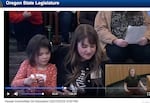When Emma Beiser testified at the Oregon State Capitol last week, she wasn’t alone. Her 5-year-old daughter, Hadley, sat beside her.
Beiser traveled to Salem to testify on House Bill 2953, which would remove Oregon’s cap on special education funding. She was one of hundreds of educators, parents, lawmakers and advocates who submitted testimony or packed in and around the hearing room on Monday to speak in favor of the bill before the House education committee.
Oregon school districts receive additional money through the state’s funding formula based on how many students with disabilities they serve. But the “SPED cap,” as it’s often called, limits how much they can get. It’s been around for decades but isn’t keeping pace with the need.
As a result, advocates say schools don’t have the money they need to properly serve students with disabilities without cutting into programs for other students — and it’s causing problems in the classroom.
Beiser is an elementary school teacher in Lebanon, but she testified to highlight her daughter’s experience as a student diagnosed with autism. She described Hadley as kind, fearless and incredibly bright. The young girl loves to jump in puddles and paint every surface of their house.
But because Hadley is almost entirely nonverbal, Beiser said her daughter can’t tell someone her name or her phone number.
“As a parent, there are no words to describe the fear that comes with sending your nonverbal child into the world without you,” Beiser said. “I’m trusting the adults in her life to not only keep her safe, but to help her navigate the world, to guide her through the halls of her school, to help her make friends with peers when her communication is so different from theirs, and to be her voice in a world that doesn’t always listen.”

A screenshot shows parent Emma Beiser holding her daughter Hadley, 5, while giving testimony to the House education committee on Feb. 17, 2025, in Salem, Ore. Beiser was speaking in favor of House Bill 2953, which would eliminate the state's special education funding cap.
Screenshot via Oregon State Legislature video / OPB
As Beiser spoke, Hadley moved around in her chair. She placed her feet on her mom’s lap and pointed. Beiser quietly tied her daughter’s shoes without pausing her testimony. Hadley later pumped hand sanitizer into her small palm. Beiser rubbed her own hands together to model for her daughter what to do with the gel, all while continuing to address the committee.
Hadley is in kindergarten this year. Despite careful planning, Beiser explained, she had a lot of problems starting out due to a lack of adults in the room.
“Hadley was eloping out of her classroom over 50 times a week, an average of 13 times a day,” Beiser said, using the term for students leaving a classroom without permission. “She even managed to leave the school building and reach the parking lot before being redirected back inside.”
The family was eventually able to get more support. Now, with an adult by her side, Hadley can more easily participate in classroom activities and class rotations with her peers. She knows all her letter names and sounds, Beiser said proudly, and can count successfully to 30.
“As a mom, I’m incredibly happy to see my daughter thriving, but as a teacher, I’m heartbroken,” she said. “Resources at her school are stretched so thin that I can see the exhaustion on the faces of her wonderful assistants.”
Beiser called on lawmakers to remove the cap so that every student has “a chance to belong, a chance to be heard and a chance to learn.”
The debate over Oregon’s cap
The state currently caps its additional funding for special education when students with disabilities in a district exceed 11% of total enrollment. However, the portion of students receiving special education services statewide is nearly 15% — more than 82,000 children in the 2023-24 school year. For some districts, that number is even higher.
Oregon Department of Education data — presented to lawmakers in a separate discussion about whether to raise the cap to 15% — shows that the current cap results in around 20,000 students not receiving funding for the services they need. School districts can apply for a cap waiver, but thousands of students are still left without adequate resources.
“For years, the waiver has attempted to support districts over the cap; but in reality … it has pushed resources around, causing resource issues in new places while trying to stem issues in others,” Louis De Sitter with the Oregon Education Association shared in his testimony.
Eliminating the cap would help address a gap of $750 million per biennium in special education funding, as Morgan Allen with the Coalition of Oregon School Administrators told the House committee. As it stands now, individual districts are covering that gap themselves.

FILE - Oregon’s Capitol building in Salem, Ore., Dec. 12, 2024. Oregon’s 11% cap on special education funding leaves 20,000 students unfunded, creating a $750 million gap districts must cover.
Kristyna Wentz-Graff / OPB
The 11% funding cap was put into place in 1991 — and hasn’t been raised since.
“I was a junior in high school. Let me tell you, as a 51-year-old woman now, that’s a long time ago,” Kimberlee Armstrong, superintendent of Portland Public Schools, told the House committee with a laugh.
Armstrong traveled to Salem to testify on Presidents Day not only as an educator, but also as a mom of two children who received special education services during their schooling. Her youngest, she said, was only on an Individualized Education Program, or IEP, for a couple of years. But her older son had one from the time he was 3 until he graduated high school.
“I think special education teachers wear capes,” Armstrong said. “They were able to help him navigate a really tricky situation, and it breaks my heart to know that we don’t have the resources to support and serve every single one of our students to the best of our abilities.”
Portland Public Schools and districts across the region are facing tens of millions of dollars in budget cuts this spring, following similar reductions last year. Special education services are not immune to these cuts. Local budgets — not to mention looming federal threats that could impact funding and programs for students with disabilities — are among the many reasons proponents are pushing for House Bill 2953 now.
Without the cap, PPS would have received approximately $15 million more for the 2023-24 school year, according to Renee Becerra. Becerra wears multiple hats in this arena, including as a member of the Special Education Advisory Council for PPS.
Becerra said the district currently spends nearly $25 million beyond state and federal special education funding out of its general fund to ensure that students with disabilities have the resources they need.
“We believe in what we’re doing in Portland. I believe in my teachers. I believe in support staff. I believe in our students,” Armstrong said. “And in order to make sure that we’re able to deliver upon the promise that we wake up every day committing, we need to make sure that we have the resources to support every student.”
De Sitter with OEA told lawmakers that opponents will claim lifting the cap would incentivize schools to over-identify students for special education as a way to get more money. But creating an IEP or other plan for a student is heavily regulated by federal laws, he said, and comes with an immense amount of work. He stressed that educators would only create plans where they’re necessary for the students’ educational growth.
“The truth is that we have spent decades underfunding the system and programs that our educators rely on to get services to the significant portion of Oregon students,” he said.
House Bill 2953 was amended with accountability measures that require the state to look into special education funding and expenditures per district and compare them to past years. The amended bill passed out of the House education committee on Wednesday. It passed on a 6-1-1 vote: Rep. Hòa Nguyễn, D-Damascus, who is a sponsor of the bill, was excused, and Rep. Darin Harbick, R-East Lane County, voted against it.
The bill has been moved toward a revenue committee, clearing a key hurdle for passage.
